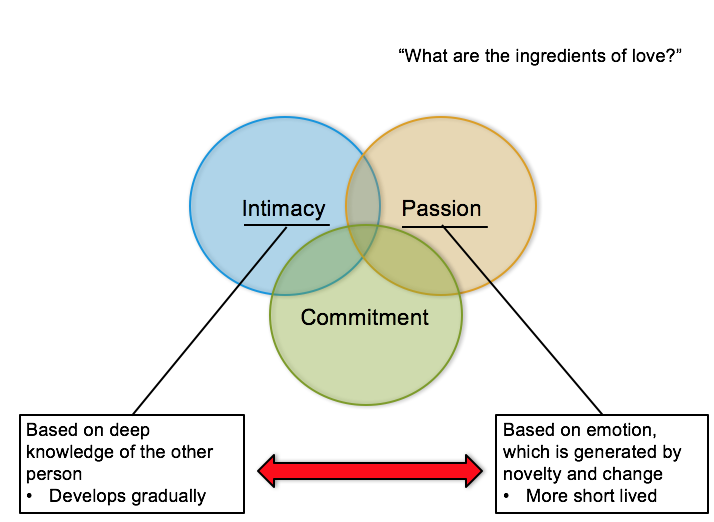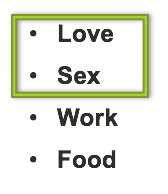Week 15 - Day 2 (Ch 14 pt 2 The Major Motives of Life)
Navigate using audio
Chapter 14 The Major Motives of Life (Food, love, sex, and work)
The Motives of Life
Why Do We Love
- Audio 0:02:03.564036
-
Biology of love
- Neurological origins of passionate love begin in infancy, when infants attach to the mother
- Hormones involved in pleasure and reward are activated in the mother–baby bond and in the pair bond of adult lovers
- Vasopressin, oxytocin
- Increasing these oxytocin leads to:
- Greater trust in risky situations
- Audio 0:02:55.228834
- Greater affection (e.g., gazing, touching) among romantic couples
- But also: Increased favoritism toward ingroup, aggression toward outgroup; increased distrust among anxiously-attached people
- Audio 0:05:06.695517
Influence of endorphins
- Audio 0:07:29.280713
- Recall: brain’s natural opiates
- Maternal comfort in humans and nonhuman animals increases endorphins
- Euphoria of endorphins may be initial motivation for affection
- “We are addicted to love”
- Similar neural responses occur in adult relationships
- Exhilaration of new love, physical and emotional distress of separation
- Audio 0:08:07.336444
- Feel like you have to be with that person
- You can look at classic writing and people will describe longing when separated from a partner
- Exhilaration of new love, physical and emotional distress of separation
- fMRIs have shown other neurological similarities between different types of love
- Audio 0:09:16.885717
- Certain parts of the brain activate when people look at pictures of their sweethearts and biological children
How Do We Form Relationships
- Two types of love and relationships:
- Passionate (romantic) love
- Love characterized by a whirlwind of intense emotions and sexual desire
- Companionate love
- Love characterized by affection and trust
- In most enduring relationships, passionate love evolves into companionate love
What is Love?
- Audio 0:12:33.850033

- Audio 0:13:52.599838
- Passion is more short-lived
- Research shows that passion and intimacy have a somewhat inverse relationship
- As one increases the other usually decreases
How do we form relationships
- Major factors influencing our relationships
- Audio 0:15:42.662116
- Proximity: we tend to choose our friends and lovers from a set of people who live, study, or work near us
- Similarity: our friends and lovers tend to be similar to us in looks, attitudes, beliefs, values, personality, and interests
- “Opposites attract” vs. “bird of a feather”
- Matching principle: the most successful romantic couples also tend to be the most physically similar
- Audio 0:18:34.111026
- Kind of bleak?
- Audio 0:23:28.590009
- Is this always true? When might it not work out this way?
- Assumes that we are completely rational about finding the most attractive person
What do you think?
- Soul mates vs. proximity?
- “Opposites attract” vs. “birds of a feather”?
- Discuss with your neighbor
- Audio 0:27:30.560891
Attachment theory of love
- Audio 0:34:17.882358
- Like infants to their caregivers, adults have attachment styles to their partners
- Idea is that the style carries over from childhood
- Secure: rarely jealous or worried about abandonment
- Anxious: agitated and worried partner will leave; clingy
- Audio 0:36:04.331544
- Need reassurance
- Physiological component – cortisol spikes when they feel the relationship is threatened
- People with this attachment style have greater physiological responses
- Say the partner makes a new friend of the opposite sex, that would cause the avoidant partner’s heart-rate to increase
- People with this attachment style have greater physiological responses
- Audio 0:36:04.331544
- Avoidant: distrustful; avoids intimate attachments
- A person’s style of dealing with romantic partners seems to be based on how they were treated by their parents
- Children form internal “working models” for what relationships should be like (e.g., “Can I trust others?”) adult relationships
- How your parents treat you seems to determine how you attach to relationships in your adult life
- However, it is just pre-disposition, it is not certain you will have this attachment style
Identify attachment
- Audio 0:39:43.233114
- “I find it difficult to trust people completely. I am somewhat uncomfortable being close to others. I feel nervous when people start to get too close. Often, I feel like people want me to be more intimate than I feel comfortable being. I find it difficult to allow myself to depend on other people.”
- Which attachment style does this describe?
- a. Anxious
- b. Secure
- c. Avoidant
- C
Identify attachment
- “I find it relatively easy to get close to other people. I am comfortable depending on other people and having them depend on me. I don’t usually worry about being abandoned or about having someone get too close to me.”
Which attachment style does this describe?
- a. Anxious
- b. Secure
- c. Avoidant
- B
What Sustains Love?
- Romantic love fades, yes; but not for everyone
- Can persist for many years for some couples
- But, loses the obsessive component that fosters constant thought and worry
- Perception by both partners that the relationship is fair, rewarding, and balanced
- Too many or too little benefits cause guilt or resentment, respectively
- Motivation: why does each partner want to maintain the relationship?
- Positive: to enjoy affection and intimacy sustainable
- Negative: to avoid feeling insecure and lonely unsustainable
- Audio 0:43:29.064671
Dealing with conflict
- The way a couple deals with conflict often determines whether the relationship will last
- Gottman (1994) describes four interpersonal styles that typically lead couples to discord and dissolution:
- Being overly critical
- Holding the partner in contempt
- Being defensive
- Mentally withdrawing from the relationship
- Attributional style also plays a role
- Good outcomes -> situation
- Bad outcomes -> each other
- Assigning the outcome of an event to be the partner’s fault
- Audio 0:46:14.837809
Vocab
| Term | Definition |
|---|---|
| biology of love | Describes the hormones involved in pleasure in reward which are activated in the mother-baby bond and in the pair bond of adult lovers (Includes endorphines) |
| passionate love | Love characterized by a whirlwind of intense emotions and sexual desire |
| companionate love | Love characterized by affection and trust |
| proximity | A factor in forming relationships. The idea that we tend to choose our friends and lovers from a set of people who live, study, or work near us |
| similarity | A factor in forming in relationships. The fact that our friends and lovers tend to be similar to us in looks, attitudes, beliefs, values, personality, and interests |
| matching principle | the most successful romantic couples also tend to be the most physically similar |
| secure attachment | Attachment style which is rarely jealous or worried about abandonment |
| anxious attachment | Attachment style which describes people who are worried partner will leave |
| avoidant attachment | Attachment style in which people avoid intimate attachments |
| postive motivation for relationship | Motivation for staying in a relationship which involves enjoying affection and intimacy |
| negative motivation for relationship | Motivation for staying in a relationship which involves avoiding feeling insecure and lonely |
| Gottman’s four dissolution behaviors | Being overly critical, holding the partner in contempt, being defensive, and mentally withdrawing from a relationship |
